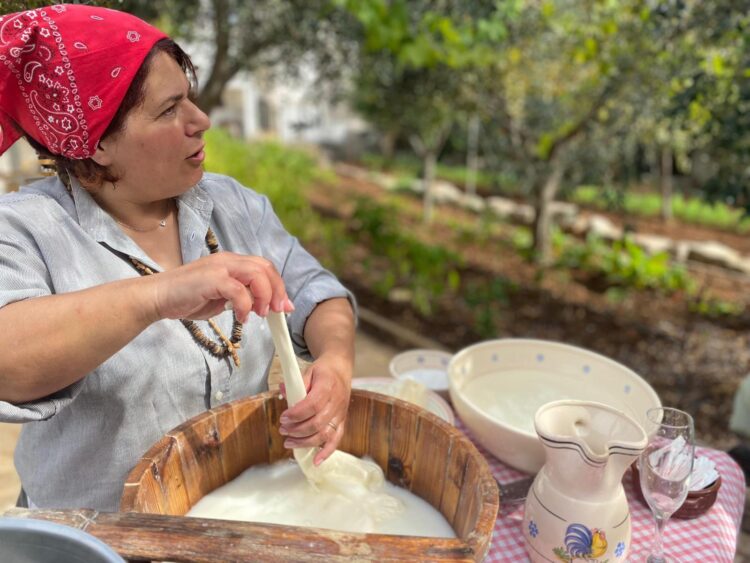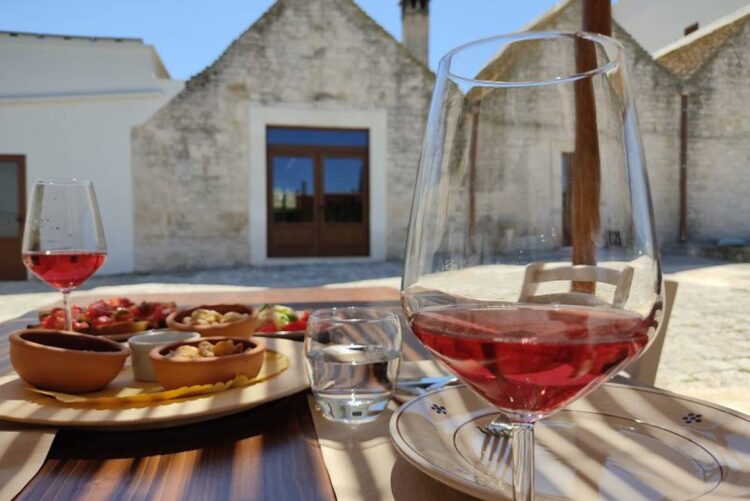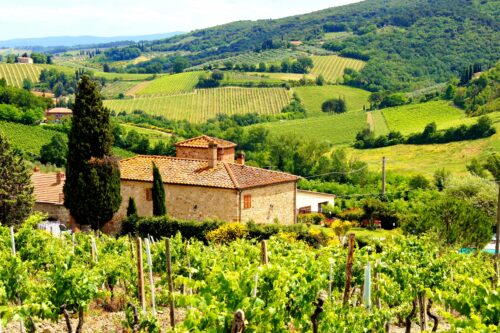 https://www.magaritours.com/wp-content/uploads/2025/11/casoncellothefork-500x250.jpg
Italian dish of Casoncelli della Valle Imagna
https://www.magaritours.com/wp-content/uploads/2025/11/casoncellothefork-500x250.jpg
Italian dish of Casoncelli della Valle Imagna
Is Italy good for solo travellers who love food?
Read More
At an Italian table, what you say matters almost as much as what you eat.
You’ve been invited to dinner. Not at a restaurant, but somewhere far more meaningful: a family kitchen in Sicily, perhaps, or a candlelit table at a working masseria in Puglia where the olive oil was pressed that morning. The kind of meal Magari travellers know well – where hospitality is all par for the (3) course.
The pasta is perfect, the wine keeps flowing, and the conversation is full of laughter. Then someone says the wrong thing. Not offensive, exactly, just… off. The smiles tighten, the mood shifts, and just like that, a second invite feels out of reach.
The truth is, in Italy, the best meals start in a stranger’s kitchen. Italians take food seriously, and small things matter: how you behave at the table can make the difference between sharing another bottle of wine or being left with an empty glass. Understanding these unspoken rules means enjoying the meal fully and being treated like part of the family.
At Magari, we want to help you enjoy every meal without missteps, so we’ve created a simple guide to Italian etiquette.
The story stops mid-sentence. Every eye is on you. You glance up from your screen. Too late.
In Italy, mealtimes are for being present. Pull out your phone, and you’re subconsciously saying something else matters more than this meal, these people, this moment. And at a family dinner, whether in a Sicilian kitchen or a Puglian masseria, that message lands loud and clear.
Stick your phone on silent, hide it away, and join the conversation. Make eye contact, be curious, and ask questions. That’s good manners in any dialect.

The dish arrives, spaghetti alle vongole fresh from the kitchen, and Nonna sets it down with a huge smile on her face. You reach for the parmesan. You can practically feel the collective Italian gasp around you.
Is it rude to put parmesan cheese on a seafood dish in Italy? Absolutely, and it’s for the same reason as why asking for ketchup for pasta is frowned upon in Italy. Asking suggests the dish isn’t good enough as it is – and to an Italian chef (be it a Nonna or restaurateur), that’s an insult. It’s a classic example of what not to do in Italy as a tourist: changing the dish tells your host the cook didn’t get it right.
Cheese and fish are a no-go in Italy, where the subtle taste of seafood is meant to shine. Trying to ‘fix’ it with parmesan is a classic mistake – tourists sometimes forget this, but Magari guests know to trust the cook and take extra cheese only when it’s offered.
And when you’ve finished? End with a little scarpetta – use a small piece of bread to mop up the leftover sauce. It’s a small, affectionate gesture that says, “This meal was delicious,” and is a direct compliment to the cook.
You’ve just finished an incredible meal. Someone asks if you’d like coffee. You say, “Cappuccino, please.” Heads tilt. Smiles tighten. You’ve just committed a classic faux pas – a textbook example of what not to do in Italy as a tourist!
When is it appropriate to drink a cappuccino in Italy? Morning. That’s it. Milk-based drinks are considered too heavy for after a meal. What you want is a caffè, a short, strong espresso, or perhaps a digestivo like amaro or grappa to settle your stomach.
When in doubt, follow your host’s lead. Espresso after dinner? Classic. A splash of grappa? Even better! Picking up those little cues is part of dining like a local – and might just win you another seat at the table.
Is it rude to refuse food or drink in an Italian home? It can be. In Italy, food is how people say, “I care.” Saying “no thanks” too quickly sounds like, “I don’t.”
This is especially true at a family-run masseria dinner, where the table is full of home-grown vegetables, hand-rolled pasta, and jars of last year’s tomatoes. The generosity is genuine, and your “no” needs to match that warmth.

It’s a working countryside estate – think olive groves, vineyards, kitchen gardens, and meals built around what’s in season. Respect, curiosity, and heartfelt praise earn you that second invite here.
Enjoy a journey of discovery with a tour and wine tasting at family-owned Masseria Torricella. An organic artisanal winery which has its origins dating back almost 80 years ago to Grandpa Francesco Consoli. Nowadays, his three grandsons, brothers Peppe, Francesco and Massimo use agronomic techniques and work with renowned winemaker Marco Mascellani to reflect the precious teachings of their Grandpa! Their high-quality wines are created with care and compassion in the spectacular area of Apulia.
While it’s not necessarily rude not to finish your plate, refusing a second serving can come across as a little cold. Instead, let her give you just a little more, or say gently, “Basta così, grazie.” Then tell her why it was wonderful – compliments are the only acceptable way to stop the refills!
How do you properly compliment an Italian cook or host? Skip the generic “Delicious.” Tell them why – that sauce, that seasoning, that bit of magic you can’t quite place, will get you a bigger smile than “Yum.”
The night’s going great. Wine’s flowing, the conversation’s easy – then someone makes a joke about Italian politics. Suddenly, the only thing colder than the gelato is the room.
Some conversations are best left off the table – especially early on. What topics are considered rude or taboo at the Italian dinner table? Politics and religion top the list, but stereotypes, even affectionate ones, can derail the evening.
These conversations are for close friends, not for someone you just met. Mistakes often come from assumptions: that all Italians are the same, that regional differences don’t count, or that a week’s holiday makes you an expert. Stick to safer topics: Food, family, travel, and learning about regional traditions.
Manners still matter – especially with nonna watching.
The rules are simple: don’t rest your elbows on the table, wait until everyone’s seated before digging in, and never, ever put the bread upside down – an old Italian superstition says it brings bad luck.
Table manners in Italy are about respect, attention, and sharing the meal properly. Even at a countryside masseria, where the pace is easy, these little gestures show you understand the culture – and that counts for a lot.
You’ve seen the hand gestures in films. They look expressive, fun. You try one. Everyone stares.

(Did you know that this gesture actually means disbelief or “what do you mean?” – obviously not what you want to gesture to the kind person who’s cooked your food!
So yes, some gestures are innocent, others… not so much. What Italian gestures should foreigners avoid using? Most of them, unless you’re absolutely certain of the meaning. Some are playful. Others are profane. Add in regional differences (what’s playful in Rome can be rude in Sicily) and you can see how quickly charm turns to offence.
Keep it simple. Smile, say “grazie,” and let warmth do the talking. That’s the kind of language everyone understands.

Wondering how to order a glass of wine in Italy? Start with “Un bicchiere di vino rosso/bianco, per favore” (A glass of red/white wine, please). Don’t dismiss the vino della casa – house wine isn’t “cheap,” it’s local pride in a glass.
Ask what pairs best with your dish, take a sip, and enjoy. Ordering wine in Italy is simple: match it to the food and relax. Oh, and a little Magari tip, off-season in Spring is definitely the best time to taste the best Italian wines.
Do we tip waiters in Italy? Service is usually included in the bill. Leaving a euro or two is a nice gesture if you loved the experience, but it’s never expected. Tipping culture in Italy is nothing like the UK or US.
Oh, and don’t forget, a simple and warm: “Salute!” or “Cin cin!” is all you need to know for a good toast!
You’ve made it through the meal – no ketchup on the pasta, no cappuccino after dinner, no awkward debates about politics. But how do you really make sure you’re invited back?
Earning that second invite in Italy is about appreciation. Italians don’t expect you to know every rule – they just notice when you care. A genuine thank-you, a thoughtful toast, or even a respectful question about where you are speaks volumes.
So before you leave the table, here’s a quick Q&A on what to say, do, and understand – the little details that turn a guest into family.
Keep it warm and personal: “Grazie mille per la cena – ogni piatto era perfetto.” (Thank you so much for dinner – every dish was perfect.)
The kind of dinners where these rules matter – the family kitchens, the farm tables, the meals that turn strangers into friends – aren’t easy to find on your own. At Magari, we’ve spent years building relationships with the people who open their homes, masserie, and trattorias to our travellers. These are invitations you can’t book online.
From rolling pasta with a Puglian nonna to sharing wine at a Sicilian farm where three generations still work the land, our small group tours give you a seat at tables most visitors never find. Ready to experience Italian hospitality the way it’s meant to be shared? Browse our Italy holiday packages and discover the meals – and the moments – that make you part of the family.
For more insider stories and travel tips straight from Italy, check out our stories page and sign up for our newsletter. And if you’d like to chat about planning your perfect Italian escape, get in touch with us today.
Master what not to do in Italy as a tourist, and you’ll be treated like famiglia wherever you sit down to eat.
 https://www.magaritours.com/wp-content/uploads/2025/11/casoncellothefork-500x250.jpg
Italian dish of Casoncelli della Valle Imagna
https://www.magaritours.com/wp-content/uploads/2025/11/casoncellothefork-500x250.jpg
Italian dish of Casoncelli della Valle Imagna
Read More
 https://www.magaritours.com/wp-content/uploads/2025/05/A-local-bread-shop-in-Alberobello-500x375.jpeg
A local bread shop in Alberobello
https://www.magaritours.com/wp-content/uploads/2025/05/A-local-bread-shop-in-Alberobello-500x375.jpeg
A local bread shop in Alberobello
Read More
 https://www.magaritours.com/wp-content/uploads/2024/01/Tuscany-Italy-500x333.jpg
Tuscany, Italy. A typical view of a villa and rolling Tuscan countryside with vineyards all around.
https://www.magaritours.com/wp-content/uploads/2024/01/Tuscany-Italy-500x333.jpg
Tuscany, Italy. A typical view of a villa and rolling Tuscan countryside with vineyards all around.
Read More